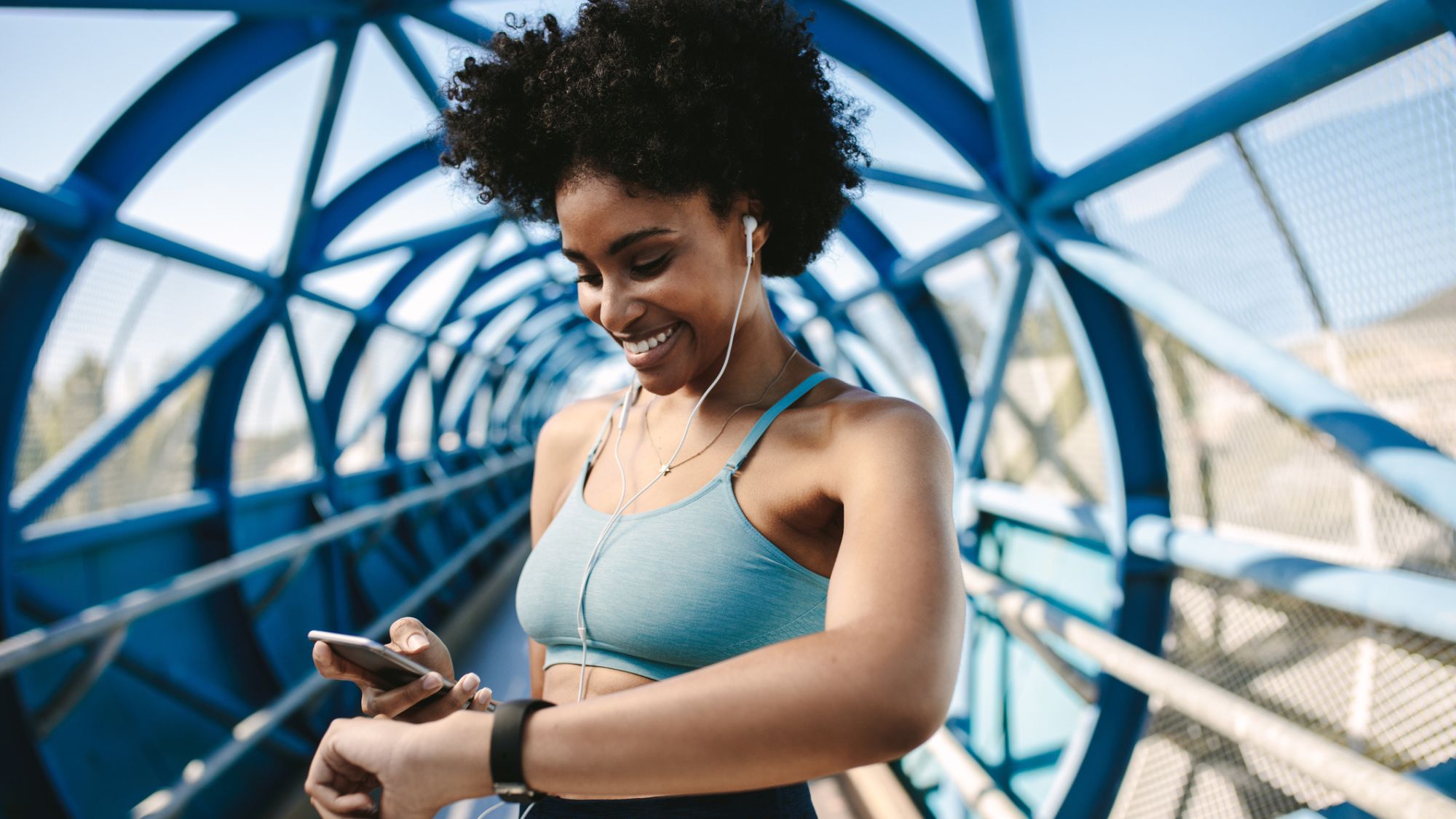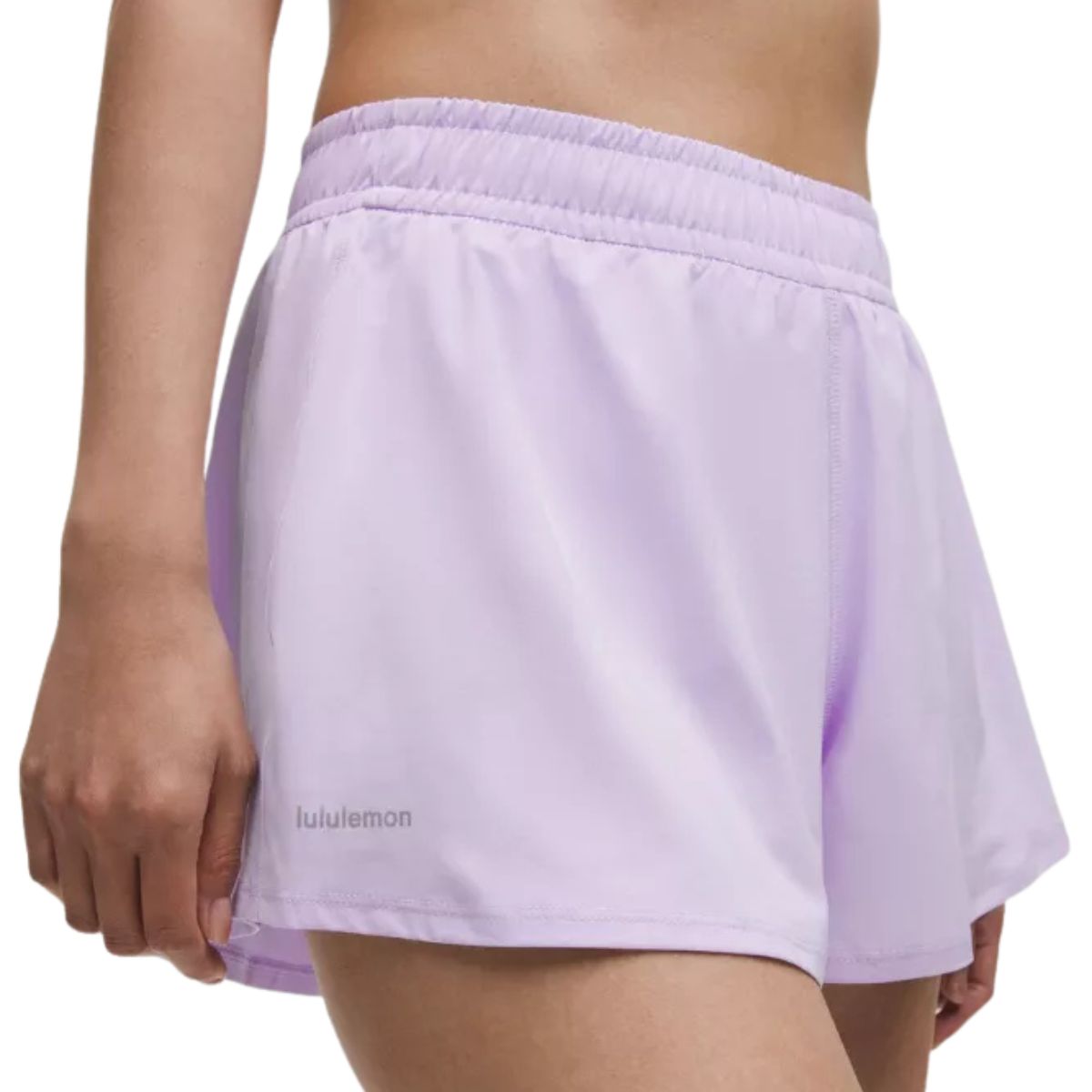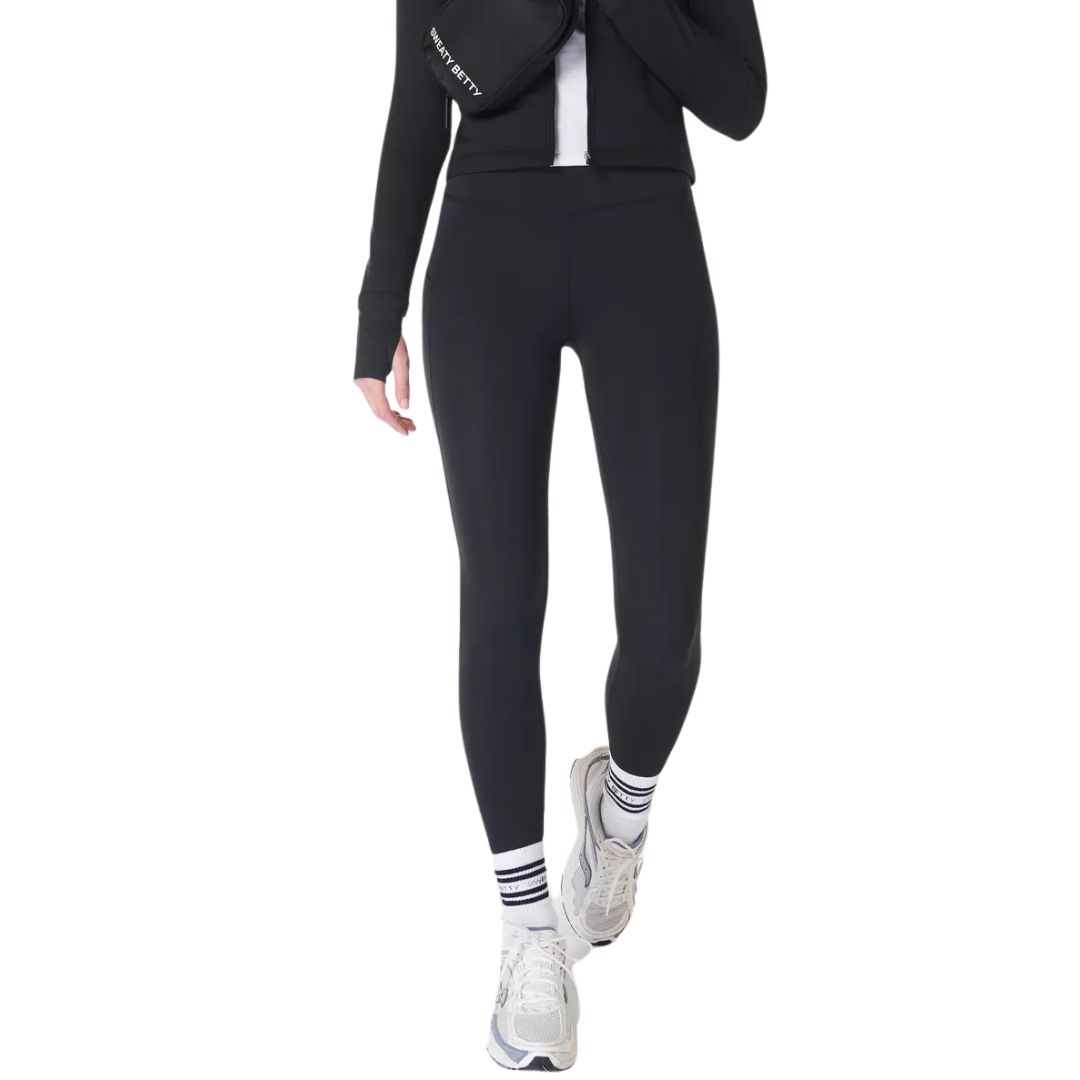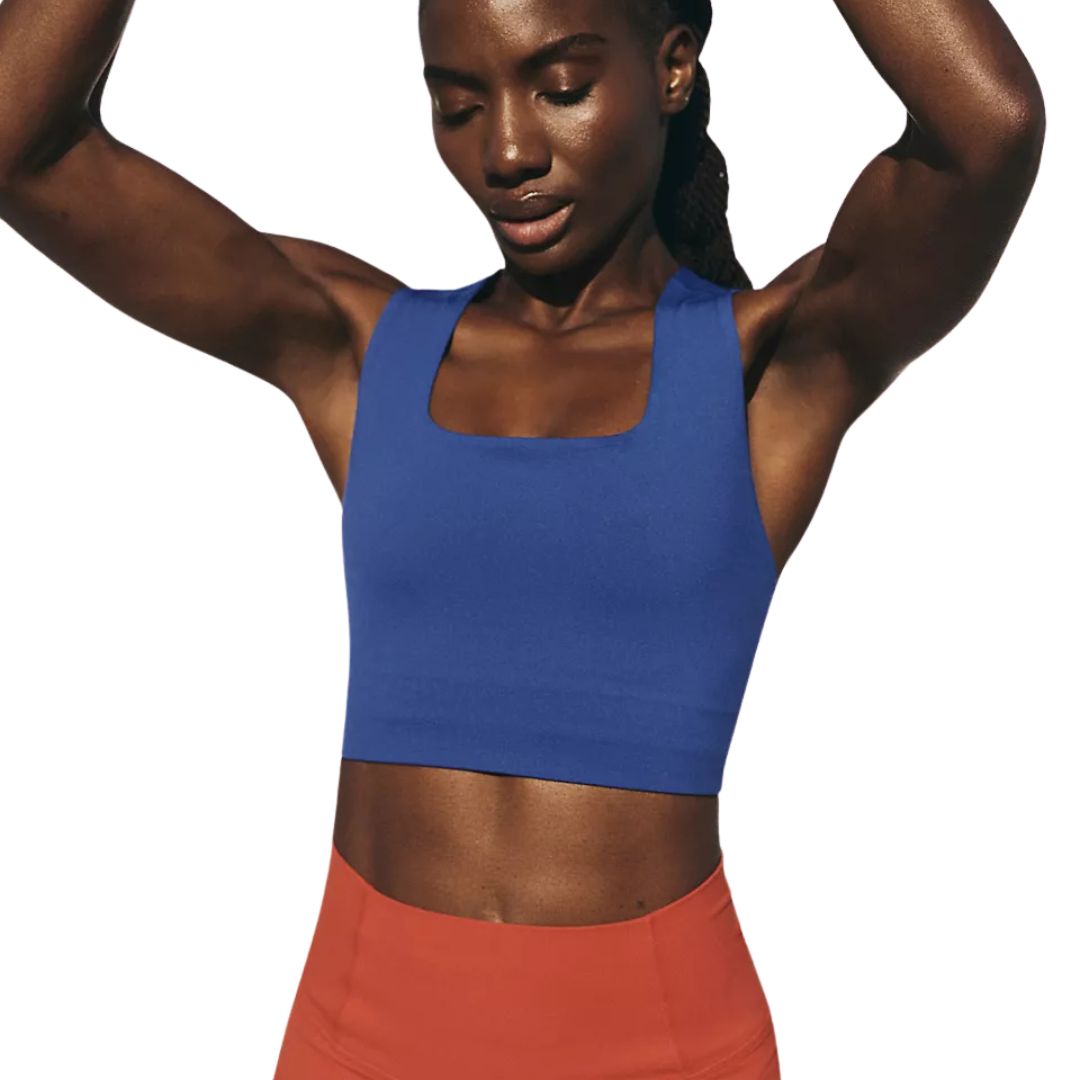Aspiring Runner? It’s Official: 9 Best Running Apps to Download to Boost Cardio Fitness, Stat
Looking to get started with running or improve your pace? A running app could be just what you need.


Feeling inspired to give running a go? Maybe you’ve already signed up for a 5km, 10km, half marathon, or full 26.2 - read our top marathon training tips. Whatever your ability, our guide to the best running apps will likely help, as they're designed by pros.
Whether you're an experienced runner who wants to know how to run faster or someone keen to learn how to start running from scratch, a running app could be key to achieving your goals.
Most running apps offer you the chance to track data such as your distance, pace, and elevation. If you link it up to a smart device, such as a fitness tracker, then you can access even more insights: heart rate, calories burned, and even running stride. In essence, a running app can offer up a wealth of information which, when harnessed in the right way, can provide a real boost to your training.
The problem is - where to start? There are 6,570,000,000 results for "running app" on Google, all promising similar results. That's why team Marie Claire UK have put them to the test for you to tell you which are actually worth the download. Amy Sedghi is an experienced fitness writer and keen runner, having completed the London Marathon this year, and Ally Head is MC's Health Editor and a nine-time marathoner. Here, they share their go-tos.
Don't miss our guides to the best fitness apps and best yoga apps, while you're here.
9 best running apps to download if you're an aspiring runner, tried and tested
What are the benefits of downloading a running app?
"Training apps can be great as they provide runners with structure, which ordinarily they may not have," explains Lewis Moses, running advisor for INCUS Performance and lead coach at New Levels Coaching.
When training for a specific event, like the London Marathon (which I trained for earlier this year), running apps can also help provide a structure by providing week-by-week breakdowns and helping you see how far you've come (both in terms of overall mileage and in development). In my case, they also were useful for putting things in perspective and reminding me of how much time I had before the big day.
Celebrity news, beauty, fashion advice, and fascinating features, delivered straight to your inbox!
There are a wide variety of running apps out there, and like everything in life, some will work for you and some won't be your cup of tea. Personally, I like to have a mix of options, from those that help with motivation and running plans to those where you can delve into the data a little deeper.
Below are mine and Ally's six favourite running apps worth trying out. Some are fitness apps that I also use to track other activities that I enjoy, such as swimming, cycling, hiking, and yoga.
1. Best new running app
Newly launched URunn launched today and looks set to shake up the running app world. Promising to be a personal running coach in your pocket, it was founded by elite running coaches Mo Farah, Adam Clarke, and Charlotte Purdue.
Using intelligent AI, URUNN offers truly personalised training plans to improve your running performance.
What we thought when testing: The app really does offer ultra-personalised training plans - as in, no two runners get the same plan level of personalisation. This makes it a great option for beginners or more advanced runners alike, as the entire programme is tailored to your personal lifestyle requirements, current fitness level, and goals. Plus, there's a handy AI-powered coach on hand to offer 24/7 support for any questions or motivation you may need.
Other need-to-knows? It integrates with pretty much all devices, including Apple Watches, Garmins, and even Strava.
Speaking exclusively to MC UK, co-founder Sir Mo Farah shared: "I’ve spent my life chasing goals, on the track and off it. And now, it feels amazing to take everything I’ve learnt and use it to support other runners on their own journeys.
"What I love about running is that every step forward matters. Whether you’re shaving seconds off your 5K or building up to your first marathon, that drive to improve makes you a performance runner in my eyes. And that means you deserve the kind of training and support that helps you keep progressing.
“With URUNN, we’ve built something special. Training that brings top-level coaching to runners of all abilities, paces and distances. We meet you where you’re at, and together, we go further.”
Cost: £93.99 a year.
A post shared by URUNN | Personalised running plans (@urunnofficial)
A photo posted by on
2. Best for beginners
The hugely popular NHS running plan, Couch to 5km, has an accompanying free app. Its main focus is to guide complete novices into being able to run a 5km comfortably within nine weeks (read our running tips for beginners, here).
It's also really handy if you've been out of the loop for a while and are looking to get your fitness levels back up - in my case, I skipped ahead on sessions I knew I could comfortably tick off and started from further within the plan.
What we thought when testing: While some embraced exercises and upped their number of workouts during the pandemic, I went the other way. A keen runner before lockdown, I took a break for a good while, which made getting back into the swing of it a little intimidating.
The beauty of the app is that it's accessible, easy to use, and completely non-judgmental. If the idea of getting your head around "negative splits" and "fartlek runs" is too much (understandable), then start off with the Couch to 5K, where you'll be gently guided through. There are some celebrity trainers to join you on your runs too, from Jo Whiley and Sarah Millican to Olympian Denise Lewis.
Ally used it when she first started running, too, and still recommends it to anyone looking to start out.
Cost: Free. Available on both Apple and Android devices.
A post shared by Jo Whiley (@jowhiley)
A photo posted by on
3. Best for Garmin users
This is the best running app to go for if you have a Garmin device. If you're using an Apple Watch, Fitbit or WHOOP band, then there are corresponding apps for those, too. Essentially, though, they're created to help you make the most of the data your fitness tracker is collecting during your workouts (and day-to-day life).
What we thought when testing: As I use a Garmin Swim 2 watch, Garmin Connect is one of the running apps I have it connected to, so I can instantly see my runs once I've finished. As well as making note of measures, such as heart rate, distance and pace, it also records how stressed it thinks I am and how much it reckons I've slept (I look at this data but take it with a pinch of salt).
During the London Marathon, the Garmin watch was as much my guide as the pacers and runners en route, as I focused on my heart rate to check if I was keeping to the required effort level I was after. I could drill down into the data it collected after to analyse my run, which is helpful for future events.
The thing I really love about the Garmin Connect app is the dashboard, which shows me measurements of my activities at a glance. The training plans are also super useful, especially if you don't train with a running club or a coach but want guidance.
Cost: Free. Available on both Apple and Android devices.
A post shared by Garmin Running (@garminrunning)
A photo posted by on
4. Best overall
"If it's not on Strava, it didn't happen" is a phrase I hear often, but not necessarily one I pay much attention to. For example, my London Marathon activity still hasn't been uploaded, but believe me when I say: I certainly know it happened.
Having said that, Strava is a great tool for tracking progress, comparing against past efforts (and with others), and working towards goals. Personally, I find it keeps me accountable, too, especially when I've shared training goals with friends and I know they'll see my activities. A bit of kudos post-run is always a nice ego boost.
What we thought when testing: One really great thing about Strava is that it's an app that's compatible with a number of different fitness trackers. You can also set it up so that it automatically uploads finished activities from the GPS device or watch when you have an internet connection, making it truly effortless. I love that it's one less thing for me to have to do when I get in the door.
There's plenty on the app for those who are competitive: running challenges, collecting virtual trophies, and competing for segments, but it doesn't need to be all about comparing your activities with others. I find breaking down my own runs, looking at how my effort compared km by km, helpful, and sometimes, I just enjoy adding pictures and videos (a new feature for Strava) to my uploads.
Ally uses Strava for accurate GPS tracking, a handy training log, and a social-focused way of connecting with other runners, too.
Cost: Free, although a Strava Premium subscription allows access to additional features. It's currently priced at £6 per month, or £4 per month if billed annually. Available on both Apple and Android devices.
A post shared by Strava (@strava)
A photo posted by on
5. Best for guided workouts
Guided workouts on apps can be excellent, but one thing that can cause an issue is trying to follow along by watching an instructor on screen whilst your head is supposed to be elsewhere. WithU have solved that dilemma, though, with their audio-guided workouts. Just remember to grab your exercise headphones before you head out.
What we thought when testing: There's a good range of structured running workouts on the app, but it's also useful to mix in some strength, conditioning and stretching exercises when you're training. In that respect, this app has it all.
In total, there are more than 1,000 audio-guided workouts to choose from, including those from a new partnership with Parkrun. As part of the collaboration, WithU have created five eight-week programmes designed to work for runners of all abilities (it also mixes up runs with mobility flows and other beneficial sessions). What's also really cool about the runs is that the real-time GPS tracking allows for WithU's coaches to give you a shout of motivation just when you might need it most.
Cost: Free to download and to use a number of workouts. To access the full range, a membership to WithU Unlimited is required and costs £9.99 for a monthly rolling plan or £79.99 for an annual one. Available on both Apple and Android devices.
A post shared by WithU Training (@withu)
A photo posted by on
6. Best for improving speed
One of the newer running apps that's exploded onto the scene in recent years, Runna is a firm favourite among influencers and celebrities alike. Using AI to deliver tailored plans personalised to your current goals, it covers everything from beating your 5km personal best to finishing your first marathon.
Founded by Ben Parker and Dom Maskell shortly after the first UK lockdown in 2021, the app was acquired by Strava earlier in the year and seems to be going from strength to strength.
What we thought when testing: There's no denying that Runna is super easy to use - it's really intuitive and offers running plans tailored to your current fitness levels and training goals. Plus, the workouts remain varied, meaning you never get bored or dread ticking off the same sessions week after week.
One of my favourite elements about the Runna app, though, is the personalised strength, conditioning and mobility support that the coaches programme every week alongside your cardio training. This is absolutely essential for injury-proofing your body, and by having it bookmarked as part of your training, it helps you to make it slot seamlessly into your week rather than being another add-on that drops off when you get busy.
Cost: £99.99 per year or £15.99 per month.
A post shared by Anya Culling (@a.culling)
A photo posted by on
7. Best for finding community
Another virtual run coaching app offering personalised plans and a great community hub is Coopah, an app dreamt up by co-founder Pete. He turned to running to cope with grief after losing his mum to a heart attack, but often found running clubs intimidating and running coaches too expensive.
And so Coopah was born - an app designed to help all runners easily access the right training plans for them without an enormous price tag, not to mention find a welcoming and encouraging community to engage with.
What we thought when testing: A well-built and simple to use app interface, Coopah assigns your weekly sessions. Plus, they've just rolled out a new feature which allows you to move your sessions to the days that work for you (rather than always sticking to your long run on a Sunday, for example).
Plus, they make a pretty punchy promise on their website - if you don’t hit your goals, they'll give you your money back. What have you got to lose?
Cost: £9.99 per month or £59.99 per year.
A post shared by Coopah | Run Coaching App (@coopahruncoach)
A photo posted by on
8. Best for iPhone
MapMyRun delivers everything that you might want to get started, such as being able to track your run on your phone (useful in case you don't want to or can't invest in a smartwatch or fitness tracker), plus it gives you simple feedback, such as distance and duration of activity.
That doesn't mean that it's not a useful tool for more experienced runners. There's the ability to analyse data and adjust training plans in the app, as
What we thought when testing: This is one of the first running apps I used way back when I first laced up my trainers. I like that you can also sync the running app with Under Armour's smart shoes - in other words, send your run data straight from your shoe to your phone.
Cost: Free to download. Available on both Apple and Android devices.
A post shared by UA My Map Run (@mymap_fitness)
A photo posted by on
9. Best for trail
Komoot
If you're into trail running, then Komoot is an app to download pronto. It's a community-focused app that brings together running routes and 'highlights' (whether that be a scenic viewing point or pub along the way).
You can adjust the search for routes, depending on the area, length of run you're after, terrain, and difficulty level.
What we thought when testing:
I really enjoy using it to discover new off-road routes and for mixing up training by including it in some trail runs. As well as finding maps from those you follow, or from strangers, Komoot also puts together collections of routes, such as this one on the top 20 best runs around the London borough of Tower Hamlets. It's also really fun to explore popular routes when you're travelling or in a new area.
Cost: Free to download. To access some features, a subscription to Komoot Premium is required and costs £4.99 a month. Available on both Apple and Android devices.
A post shared by Komoot (@komoot)
A photo posted by on
Happy running.
Shop MC UK approved running kit now:
Amy Sedghi is a freelance journalist, specialising in health and fitness, travel, beauty, sustainability and cycling.
Having started her career in The Guardian newsroom working with an award-winning team, Amy's proud to have reported on a variety of topics, speaking to a range of voices and travelling far and wide to do so. From interviews on ski lifts to writing up breaking stories outside courtrooms, Amy is used to reporting from a range of locations (she’s even been known to type up a story in a tent).
She also loves being active, spending time outdoors and travelling - with some of her favourite features she’s worked on combining all three. Cycling and eating her way round the Isle of Man, learning to sail on the Côte d'Azur and traversing the Caminito del Rey path in Spain are just some of her highlights.
Covering a diverse range of subjects appeals to Amy. One minute she may be writing about her online styling session with Katie Holmes’ stylist and the next she’s transporting readers to the basketball courts of Haringey where she joined a group trying to lower knife crime in the capital.
While at university, Amy was awarded The Media Society bursary. Following her stint at the Guardian, Amy worked at Google and as well as writing for Marie Claire, she regularly contributes interviews, features and articles to National Geographic Traveller, The Guardian, The Independent, The Telegraph, Stylist, Refinery29, Glorious Sport, Cycling Weekly and Rouleur.
When she’s not writing, Amy can be found trying to get through her towering stack of books-to-read, cycling down at Herne Hill Velodrome or looking for the next place to eat and drink with friends.



